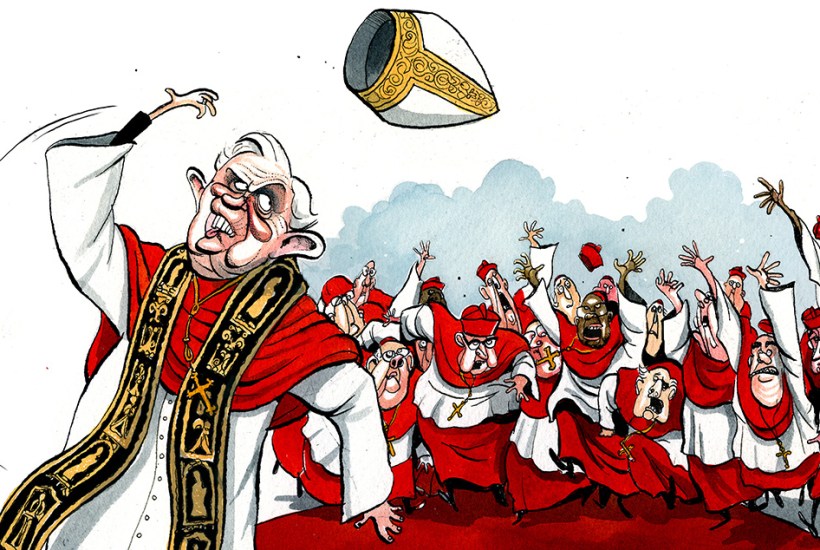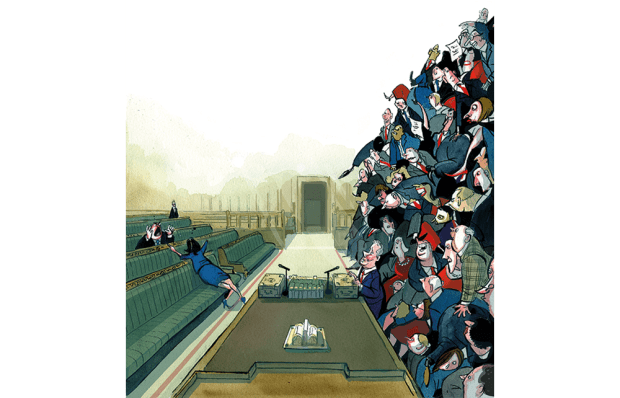Oxford’s Big Brother
Sir: Your Oxfordshire council correspondent (Letters, 7 January), who refers to himself as the corporate director of environment and place, refutes Rod Liddle’s description of councillors as ‘dictators’ and his criticism of the way Oxford will be divided into zones to reduce traffic. Bill Cotton’s letter put me in mind of Nineteen Eighty-Four. The sectors, the checkpoints, the control of access, the difficulties in just trying to go about your business, the paperwork.
Ah, the paperwork! Cotton’s letter mentions residents’ applications for permits – at cost – to drive through the ‘filters’ for 100 days or 25 times a year for county visitors. How will people keep track of these? Blue badge holders, some frequent hospital visitors and health workers will be ‘eligible’ to drive through the checkpoints. Authenticating and issuing these alone will be a huge task.
The checkpoints will be ANPR cameras, manned by hosts of ‘guards’ watching every car’s number plate in some building somewhere, checking if they have the correct ‘papers’ or permits. The cost of the technology and staffing operations, day and night, and the bureaucracy involved will be immense. But ‘they’ will have asserted control over us!
John C. Batey
Oxford
The Spectator test
Sir: According to Mark Galeotti, the Turing Test of artificial intelligence (AI) hinges on devices being ‘able to communicate in a way which cannot reliably be distinguished from a human’ (‘Power play’, 7 January). In my view the bar for AI should be set at a rather more robust and rigorous level by using the Spectator Test of Artificial Intelligence. This involves an AI device being able to read an article in The Spectator, forward a comment, and have it published in the Letters page. When this happens we will know that the era of artificial intelligence has definitively arrived.
Ivor Morgan
Lincoln
Peach’s reach
Sir: I enjoyed Charles Moore’s story of rifling through his old Ladybird books (Notes, 17 December) and agree with him about their beauty and importance. I eventually studied history at university and have always enjoyed delving in history, and am convinced that the Ladybird Adventures from History series (combined with the marvellous R.J. Unstead) started me out. In subsequent years as a secondhand bookseller, I have found the Ladybirds to be popular with successive generations. As for L. du Garde Peach, he was indeed a dramatist – I have a copy of his The Queen’s Ring, about Elizabeth I and the Cavendish family, in my collection. Long may the works of L. du Garde Peach continue to entertain and inform young minds.
David Ford
Saltaire, West Yorkshire
Benedict’s blessing
Sir: Father Patrick Burke rightly points to Pope Benedict’s impressive body of academic and devotional writing (‘A man of letters’, 7 January). On this alone, the case for Benedict to be canonised as a Doctor of the Church is overwhelming. But there are other reasons for the cries of ‘Santo subito!’ at his funeral to be answered quickly. Apart from his personal holiness, humility and kindness, he bestowed a significant blessing on contemporary Catholicism: peaceful unity. Tensions between those who love the old Latin Mass and those devoted to the liturgical reforms after Vatican 2 have divided the faithful for decades. By his motu proprio ‘Summorum Pontificum’, which gave every priest in the world permission – but not an obligation – to celebrate Mass according to the Old Rite, Benedict gently restored mutual tolerance and respect within the Catholic family. Sadly, Pope Francis seems determined to undo this eirenic settlement.
Francis Bown
London E3
The glow of gaslight
Sir: To provide assurance to Christopher Howse (Notes On, 26 November), the gaslight business is alive and well up north, however much Westminster may be destroying it in the health and safety-obsessed south. The Keighley & Worth Valley Railway is the proprietor of Britain’s third-largest gaslighting operation, with almost 100 burners. Four of its six stations are wholly gaslit, the fifth is by paraffin oil, the sixth by a venerable electrical system. All are in constant use, as are those which light four of its five car parks. There is a training scheme to qualify volunteers in the installation of these miracles of Georgian ingenuity. The KWVR is one of the wonders of the world, particularly at this time of year, immersed in gaslight. It is a Dickensian delight; come and see for yourselves!
David Pearson
Haworth
Rod the Scot
Sir: I knew it, I knew it, Rod Liddle is a Scotchman! (‘My DNA results are in’, 7 January.) Scotland: the land of many great wonders and some less so. However, Wodehouse was perhaps on to something regarding rays of sunshine, Scotchmen with a grievance and the difference between. Welcome home, you grumpy old bugger.
John MacLean
Isle of Iona, Scotland
Fine print
Sir: Regarding Jonathan Sumption’s article on manuscripts (Books, 17 December), I can’t afford such artefacts but incunable leaves from disbound books – individual pages of thick paper made from linen rags – are within my reach. Some have black-letter gothic lettering printed in Strassburg in the 1470s, others delicate serif faces printed in Venice at the same time. I was apprenticed as a hot-metal compositor in the 1960s, and feel a connection with the craftsmen.
Gordon Young
Bristol
Got something to add? Join the discussion and comment below.
Get 10 issues for just $10
Subscribe to The Spectator Australia today for the next 10 magazine issues, plus full online access, for just $10.
You might disagree with half of it, but you’ll enjoy reading all of it. Try your first month for free, then just $2 a week for the remainder of your first year.














Comments
Don't miss out
Join the conversation with other Spectator Australia readers. Subscribe to leave a comment.
SUBSCRIBEAlready a subscriber? Log in